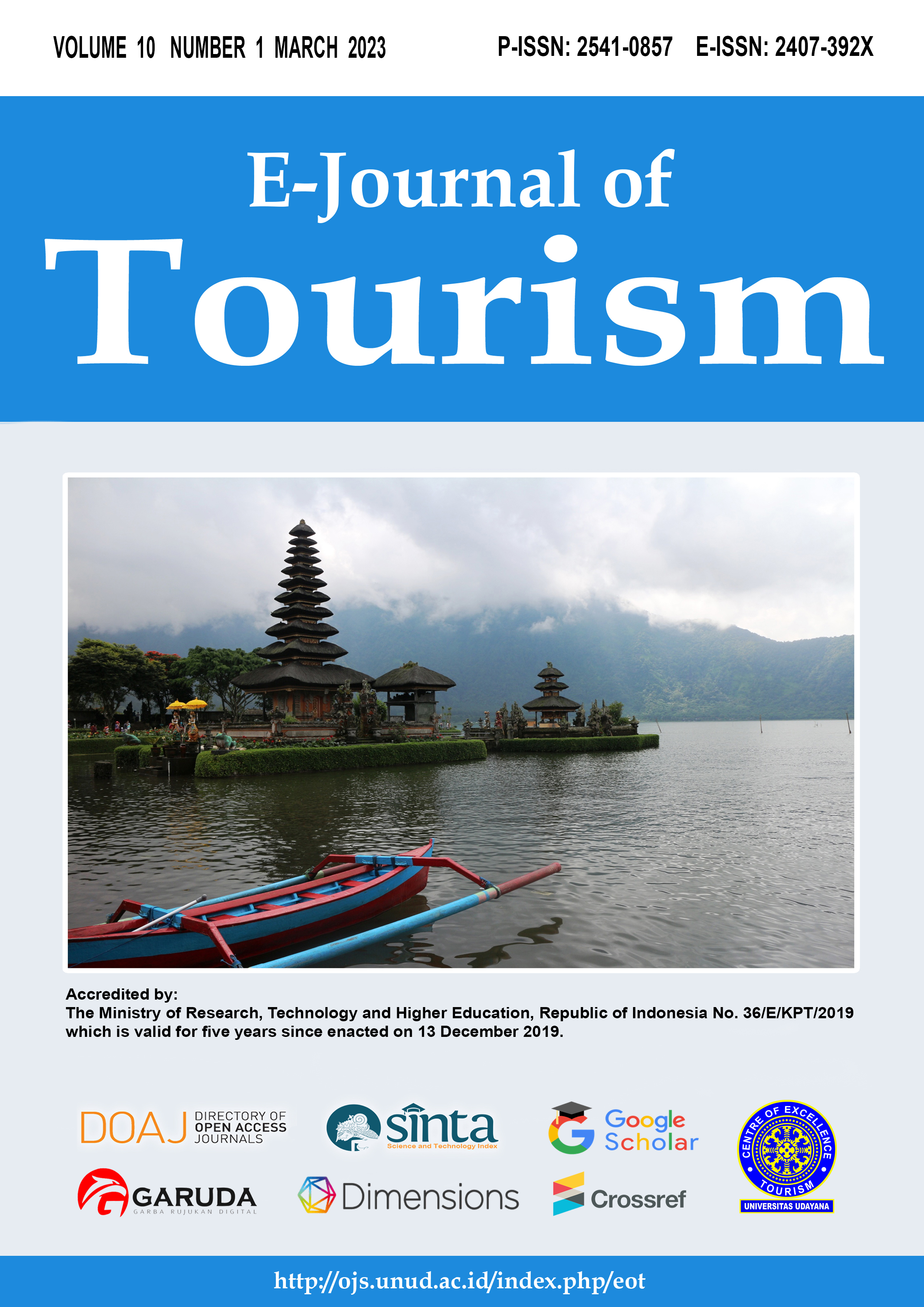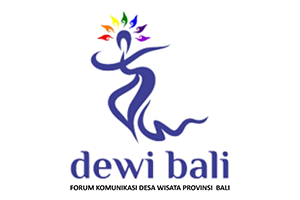Farmer Community-Based River Ecotourism Model in Gowa Regency
Abstract
Tourism is one of the leading business sectors that continues to develop in academic studies. This study aims to reveal a model of tourism activity development in supporting community business improvement in the Biroro Bontolerung River Area, Gowa Regency. The method applied is descriptive-qualitative with unit analysis of product resources and social resources at the research site. This research has identified the concept of tourism activities that are suitable to be developed in the Biroro Bontolerung River Area based on the concept of experiential tourism. Furthermore, this research has resulted in mapping the interests and interests of relevant stakeholders, to be studied further in making development decisions for the government and the community.
Downloads
References
Beardsley, M., Graaf, E. van der, Grandpré, F. de, Hohn, A., Ilves, R., Kadijk, H., Komppula, R., Konu, H., Maris, D. K., LeBlanc, M., Matteucci, X., Mitas, O., Nawijn, J., Naudé- Potgieter, R.-A., Peperkamp, E., Pesonen, J., Puczkó, L., Royer, C., Smith, M. K., … Zátori,A. (2018). Managing Quality of Life in Tourism and Hospitality (M. Uysal, M. J. Sirgy, & S. Kruger (eds.)). CABI Publishing.
Brouder, P., Teoh, S., Salazar, N.B., Mostafanezhad, M., Pung, J.M., Lapointe, D., Desbiolles, F.H., Haywood, M., Hall, C.M., & Clausen, H.B. (2020). Reflections and Discussions: Tourism Matters in the New Normal Post COVID-19. An International Journal of Tourism Space, Place and Environment, Vol. 22, 2020 - Issue 3, pp. 735-746, https://doi.org/10.1080/14616688.2020.1770325.
Budisetyorini, B., Adisudharma, D., Salam, D.A., Prawira, M.F.A., Wulandari, W., & Susanto, E. (2021). Pengembanngan Pariwisata Bertema Eco-Forest dan Sungai di Bumi Perkemahan Tangsi Jaya. Jurnal Kepariwisataan, Vol. 5, No. 1, pp. 75-88, DOI: 10.34013/jk.v5i1.220.
Creswell,J.W., & Crewell,J.D. (2018). Research design (5th ed.). SAGE Publication.
Gössling, S., Scott, D., & Hall, C.M. (2021). Pandemics, Tourism, and Global Change: A Rapid Assessment of COVID-19. Journal of Sustainable Tourism, Vol. 29, No. 1, pp. 1-20, https://doi.org/10.1080/09669582.2020.1758708.
Khalid, S., Ahmad, M. S., Ramayah, T., Hwang, J., & Kim, I. (2019). Community Empowerment and Sustainable Tourism Development: The Mediating Role of Community Support for Tourism. In Sustainability (Vol. 11, Issue 22). https://doi.org/10.3390/su11226248.
Koh, D. (2020). Occupational Risks for COVID-19 Infection. Occupational Medicine, Vol. 70, No. 1, pp. 3-5, https://doi.org/10.1093/occmed/kqaa036.
Kozak, M., & Kozak, N. (2018). Tourist Behavior: An Experiential Perspective. Springer International Publishing AG, Turkey, ISBN: 978-3-319-78553-0 (eBook), https://doi.org/10.1007/978-3-319-78553-0.
Mafruhah, I., Supriyono, S., Mulyani, N.S., & Istiqamah, N. (2019). Causality Between Tourism Industry Development and the Ecological Sustainability In Marine Environment: A Convergence and Divergence among Stakeholder With Mactor Analysis. International Journal of Energy Economics and Policy, Vol. 10, No. 4, pp. 85-92, DOI: https://doi.org/10.32479/ijeep.7989.
Meacci, L., & Liberatore, G. (2018). A senses-based model for experiential tourism. Tourism Management Studies, 14(4), 7–14. https://doi.org/10.18089/tms.2018.14401
Morrison, A. M. (2013). Marketing and managing tourism destinations. In Marketing and Managing Tourism Destinations. https://doi.org/10.4324/9780203081976.
Peters, K., Peters, J., & Peters, N. (2020). Visit People: Tourism Recovery after Disaster. KPPM Stategy, 4th April 2020.
Putro, H.P.H., Pradono, P., & Setiawan, T.H. (2021). Development of Multi-Actor Multi-Criteria Analysis Based on the Weight of Stakeholder Involvement in the Assessment of Natural–Cultural Tourism Area Transportation Policies. Algorithms, Vol. 14, No. 7, pp. 217, https://doi.org/10.3390/a14070217.
Rencana Induk Pembangunan Kepariwisataan Tahun 2015-2030 (RIPPARDA) Sulawesi Selatan.
Smith, M. (2006). Wellness Tourism. Tourism Recreation Research, Vol. 31, No. 1, pp. 1-4, https://doi.org/10.1080/02508281.2006.11081241.
Susanto, E., Novianti, S., Rafdinal, W., Prawira, M.F.A., & Septyandi, C.B. (2020). Visiting Tourism Destination: Is It Influenced by Smart Tourism Technology? Journal of Indonesian Tourism and Development Studies, Vol. 8, No. 3, doi: 10.21776/ub.jitode.2020.008.03.04.
UNWTO. (2021). Tourism In The 2030 Agenda. Tourism In The 2030 Agenda. https://www.unwto.org/tourism-in-2030-agenda.

This work is licensed under a Creative Commons Attribution 4.0 International License.
The copyright of the received article shall be assigned to the journal as the publisher of the journal. The intended copyright includes the right to publish the article in various forms (including reprints). The journal maintains the publishing rights to the published articles.




















